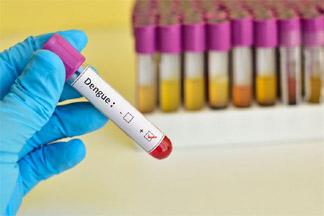
The dengue vaccine Qdenga, pre-approved by the World Health Organization in May, has shown more than 50 per cent efficacy in reducing the number of cases, with lasting effects and a good safety profile, according to a review of 19 studies.
The “first comprehensive global” review, covering more than 20,000 participants, found that upon receiving the two-dose vaccine, over 90 per cent of adults and children elicited an immune response against all four variants (serotypes) of the dengue-causing DENV virus. Of the 19 studies analysed, 13 contained data from Asian and South American locations where the disease is endemic. “Given the results in terms of safety, immunogenicity, and efficacy, the administration of two doses can undoubtedly be a key tool for dengue prevention,” said Maria Elena Flacco from the University of Ferrara, Italy, and the lead author of the study published in the journal Vaccines.
Developed by the Japan-based Takeda Pharmaceutical Industries Limited, the Qdenga vaccine—also called TAK-003 — is a live-attenuated vaccine, containing weakened versions of the four serotypes of the DENV virus.
“TAK-003 showed an excellent safety profile, and the immunogenicity after two doses against the four DENV serotypes was higher than 90 per cent among both adults and children/adolescents who were either seronegative or seropositive at baseline,” the authors wrote. While seropositive indicates a prior dengue infection or exposure to DENV virus, seronegative indicates none of these.
The authors also found that among those receiving a single vaccine dose, more than 70 per cent of adults and over 90 per cent of children and adolescents developed antibodies against the viral infection.
Source: PTI




Be the first to comment